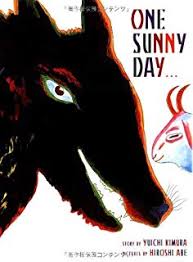Fabling Around Japan
Listen to the Recess! Clip
| Author | John Cech |
| Air Date | 7/18/2005 |

Fabling Around Japan Transcript
The scene is a deserted hut on a mountain top during a very ferocious thunderstorm. Into the cabin stumble a goat and, later, a wolf. They’re both terrified of the storm, and in the dark they can’t see who their companion is, and their noses are so stopped up, they can’t smell them either. So instead of the wolf eating the goat, the two animals become friends and they agree to meet the next day at the same hut. They’ll know each other by the pass word, “Stormy Night.” This is the basic plot of Japanese author, Yuichi Kimura’s One Stormy Night, which is part of a best-selling series in Japan that he has done with artist Hiroshi Abe that has won UNESCO’s Noma Prize for Picture Books, which is meant to honor works that stress “the importance of international cross-cultural understanding.”
In the sequel to this book, One Sunny Day, the goat and wolf meet again, in broad daylight. The wolf’s stomach is by now growling with hunger, and he has to pull himself back from letting instinct take over and literally devouring his new friend. But he chides himself to show more strength of character and not succumb to these impulses. For his part, the goat also has to restrain himself — from thinking ill of the wolf. To do so would be a lapse in his character.
Though frought with tension, all ends well, but it has taken a surpreme act of restraint from the wolf.
Character is also a question raised in Tim Myers’ Basho and the River Stones, illustrated by Oki S. Han. In this fable, the famous Japanese poet Basho is tricked by a fox, who has changed himself into a wandering monk. In Japanese folklore, foxes are magical shape-shifters. The fox/monk convinces the poor Basho to leave all the cherries on his trees in the coming year to the foxes in exchange for three pieces of gold, which turn out to be river stones in the morning. But rather than being angry, Basho cherishes the beautiful stones and even makes them the subject of one of his haikus. This act shames the young fox, and he apologizes to Basho for tricking him, and then the fox urges Basho to forget his promise to give all the cherries to the foxes — something Basho refuses to do. I won’t disclose the resolution of this particular moral and ethical quandary, except to say that these books demonstrate, with refreshing simplicity, how important it is have books like these for younger children that are exploring with them these deeper questions — about how to tame our wild things, keep our friends, and also keep our promises.